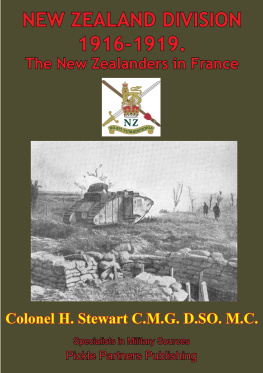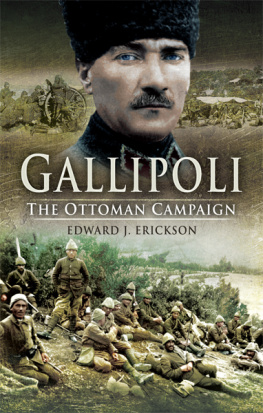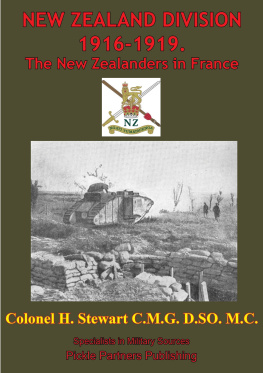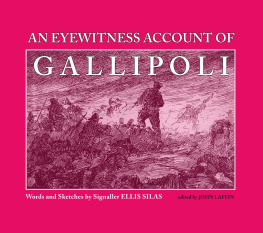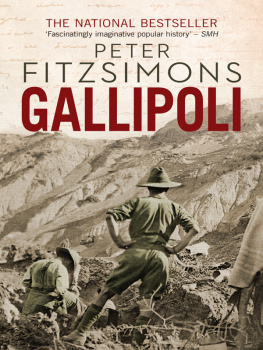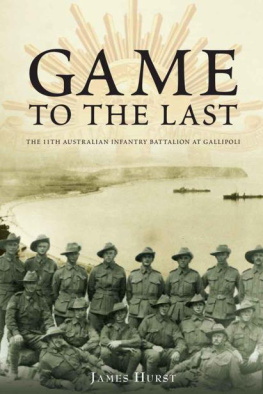

This edition is published by PICKLE PARTNERS PUBLISHING www.picklepartnerspublishing.com
To join our mailing list for new titles or for issues with our books
Or on Facebook
Text originally published in 1921 under the same title.
Pickle Partners Publishing 2013, all rights reserved. No part of this publication may be reproduced, stored in a retrieval system or transmitted by any means, electrical, mechanical or otherwise without the written permission of the copyright holder.
Publishers Note
Although in most cases we have retained the Authors original spelling and grammar to authentically reproduce the work of the Author and the original intent of such material, some additional notes and clarifications have been added for the modern readers benefit.
We have also made every effort to include all maps and illustrations of the original edition the limitations of formatting do not allow of including larger maps, we will upload as many of these maps as possible.
O FFICIAL H ISTORY OF THE
O TAGO R EGIMENT , N.Z.E.F.
IN THE
G REAT W AR
1914-1918
By LIEUT. A. E. BYRNE , M.C.
OTAGO REGIMENT, N.Z.E.F.
WITH MAPS AND ILLUSTRATIONS.
SECOND EDITION.
TABLE OF CONTENTS
Contents
PREFACE.
The decision which determined the publication of this Volume found equally its inspiration and its purpose in the desire to place on permanent record the part borne by the Otago Infantry Regiment in the Great War which desolated the World during the years 1914 to 1918, and to give it an honoured and enduring place on the crowded roll of fame among the organised forces that stood for Liberty in those dark days of tragedy and suffering, of heroism and sacrifice hitherto unknown in the armed conflict of nations.
When the compilation of the History was entered upon it became clear that the task of placing on record merely the operations with which the Regiment, in its varying strengths of Battalions, was concerned over a period of four years demanded lengthened, careful and extensive research and inquiry; but to attempt anything approaching a detailed record of the numerous examples of individual valour and sacrifice, of gallant deeds and brilliant service at the cost of suffering and death, would form in itself a monumental epic far exceeding the limits assigned this Volume. In neither instance do official diaries or records, inevitably sparse and sterile in material, always afford the amount of information essential to the requirements of reliable historical accuracy and fulness of incident.
Allowance having been made for shortcomings due to these and other circumstances, it is hoped that the operations of the Otago Regiment, as part of the New Zealand Expeditionary Force, have been invested with some appearance of historical sequence and form, and that a permanent setting has been given to the fame which the sons of Otago and Southland achieved at Anzac and Helles, on the Gallipoli Peninsula; at Armentires, the Somme, Messines, Passchendaele, Picardy, Bapaume, and Mormal Forestthe battlefields of France and Flanders. If the History succeeds in keeping fresh the memory of their unconquerable spirit, and if future generations are inspired by the story its chapters unfold, then something will have been accomplished.
It is appropriate at this point that grateful acknowledgment should be made of the generous assistance given by the Senior Officers of the Regiment towards the successful completion of the History, and of the ready response met with on all sides in the search for information bearing on obscure situations, thereby clearing the ground of much that would otherwise have made the work more difficult and less comprehensive.
A. E. B.
Dunedin, New Zealand
A TRIBUTE FROM MAJOR-GENERAL SIR A.H. Russell, K.C.B., K.C.M.G. (d.), [f.]
Rich in its traditions of race and the unpurchasable inheritance of an unconquerable spirit, still vibrant and responsive, as the historic Call to Arms so splendidly demonstrated, the sons of Otago stand out conspicuously for the brilliance of their achievements among the soldiers of New Zealand in the Great War. Otago could not, however, with its comparatively modest population be expected to provide unaided the necessary quota for the Regiment which bears its name. In order, therefore, to supply the deficiency and make up the requisite strength, men from all parts of the Dominion were drafted into the Regiment. From this formation it follows that the Otago Regiment may be correctly described as representative not only of the Province from which it takes its name, but of the Dominion itself.
At the same time it is fair to assume that its ranks included a large proportion of the descendants of those early Colonists who sailed from Greenock in the John Wickliffe , or followed the fortunes of William Cargill, leavened not inconsiderably by the sons of those adventuring Islanders of our common stock who in succeeding years made Otago their homehappy intermingling of Norman, Celt, and Saxon, to which the English speaking race owes its capacity for conquest.
It is beyond the power of a Commander in any retrospect of the crowded and stormy scenes of war to attempt to distinguish or differentiate between Battalions in their relative and contrasting vicissitudes and general treatment at the hands of Fortune. But it must be said that Fate, especially in the earlier years, seemed to take a sinister pleasure in placing the Otago Regiment in the hottest corners of the fight. Pope's Hill, May 2nd, 1915, the raid at Armentires on July 13th-14th, 1916, and Goose Alley on September 27th of the same year, were hard days; but each experience only served to put a finer edge on their steel; and henceforward Fortune smiled on men who had shown themselves independent of her favours and concerned only for the opportunities that appeal to the instinctive fighter.
Esprit de corps was a strongly marked characteristic of all the Battalions; showing itself equally in the stress and heat of conflict, in the temporary calm of rest billets, and on the march. The record put up by the 1st Battalion of Otago Regiment in its hard and hurried march to Hedauville, in March, 1918, to meet the German attack, when not a man fell out, deserves to take its place among the finest memories of the Regiment as an example of endurance, will-power, and that superb and unyielding spirit which is ever the distinguishing mark of the born soldier.
No word of the Otago Regiment would be complete without mention of the name of Sergeant Travis, first of all scouts and bravest of men, whose epitaph might well be the single word "Undefeated." Asking him one day, half in chaff, if he could produce a prisoner or two for identification, he replied, "Any time you say the word, Sir." He kept his promise.
Under a long list of capable Commanders, Charters, Smith, Hargest and others, the Regiment fought, flourished and brought back to New Zealand a measure of honour of which Otago and Southland may well be proud.
A. H. RUSSELL
Major-General.
A MESSAGE OF GRATEFUL REMEMBRANCE.
As one intimately connected with the New Zealand Expeditionary Force from the day of its birth in August, 1914, up to Christmas, 1917, and more especially associated with the Otago and Canterbury Battalions as Brigadier of the 2nd New Zealand Brigade from March, 1916, to December, 1917, I rejoice to think that the work of the Otago Regiment is to be handed down to posterity, and that the glorious deeds of the Otago men are to be kept evergreen and chronicled in a Regimental History.
Next page
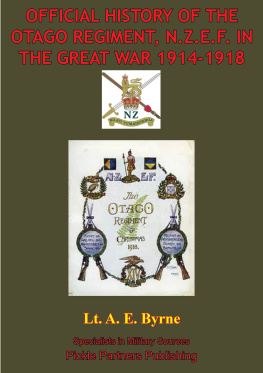
![Lt Col C. G. Powles - THE NEW ZEALANDERS IN SINAI AND PALESTINE [Illustrated Edition]](/uploads/posts/book/399129/thumbs/lt-col-c-g-powles-the-new-zealanders-in-sinai.jpg)
